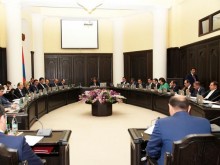News
Reproductive healthcare to become more accessible
23.06.2016

A regular Cabinet meeting was held today, chaired by Prime Minister Hovik Abrahamyan.
The Government approved the reproductive healthcare improvement strategy and the relevant action plan for 2016-2020, which aims to allow broader access to reproductive health services nationwide, provide for efficient medical care and services and continuous improvement of quality and efficiency, as well as to increase the health factors-induced birth rate.
The Executive amended one of its previous decrees in a bid to diversify and improve the quality of services provided to citizens in the field of civil registration, taking into account a number of practical problems arising in this area. The decision seeks to expand the scope of civil registration-related services and those provided to legal entities, introduce new services, which aim to improve the quality of service delivery, as well as save time and money.
For implementation of public policies and development programs in the fields of viticulture and winemaking, a national viticulture and winemaking fund has been established by the Government’s decision. According to the reference note, the Government is implementing an export-oriented industrial policy, and wine products have a great potential of export growth.
The Fund will abide by the principle of public-private partnership and will provide for high-quality and internationally competitive production. It will also support the implementation of measures aimed at upholding the prestige of Armenian wines on domestic and foreign markets.
Highlighting the adoption of the resolution, Prime Minister Abrahamyan said he was looking forth to serious results of the Fund’s operations.
The meeting approved the number of places available in the preliminary professional (vocational) education and vocational training institutions for the academic year of 2016/2017 implementing free education (allowance in the form of full reimbursement of tuition. The allocation of seats for admission under the Government’s free education (allowance in the form of a full refund of tuition fee) aims to encourage high-performing applicants and students, as well as to train specialists in accordance with the requirements of the labor market.
Minister of Education and Science Levon Mkrtchyan advised that the issue had been taken up at a consultation held with the Prime Minister earlier today. Given the importance of this issue, its social impact and the importance of providing free seats in vocational educational institutions, the Premier had ordered to discuss and finalize the matter with the Ministry of Healthcare. Levon Mkrtchyan noted that they had another recommendation on the part of the Prime Minister, that is to review the concept of vocational education system in general. The Premier had pointed to the strong need for serious discussion of free quota allocation in the health sector, urging all the agencies concerned to discuss the issue once again.
The Government will allocate money from the reserve fund for elevator repairs and asphalting of yards next to some apartment buildings in Hrazdan town of Kotayk Marz. Especially important is the component of a number of multi-asphalting yards (about the amount of AMD 120.0 million), as well as the repair of elevators in some high-rise buildings (around 30.0 Million).
Hovik Abrahamyan stressed that the issue had been discussed with the President of Armenia, noting that AMD150 million will be taken off the budget of the Government Staff and earmarked for the above-stated purpose.
The meeting approved a set of draft amendments to the laws On Electoral Code and On Legal Acts. The amendment provides for transitional provisions, which regulate the peculiarities associated with the entry into force of the draft.
Chief of Presidential Staff Vigen Sargsyan noted that this is an exceptional case of compromise, when upon completion of discussions of the Electoral Code, the Government and the working group complied with the recommendations of the opposition and civil society to adopt a more serious package of proposals, which require serious funding.
According to Vigen Sargsyan, work is underway with potential donor organizations over the funding of the project, especially with the UN Development Program. The United Nations Development Program and the EU Delegation have already estimated it at around USD16 million. Vigen Sargsyan pointed out that inter alia question is of collecting fingerprints of about 1.5 million potential voters, which requires a lot of work.
“Even if we manage to raise the necessary amount of non-budgetary funds that is donor’s contributions, great efforts will be needed to make the project feasible. That is just an expression of goodwill on the part of the Government and the State and their willingness to ensure transparency in line with international standards,” Vigen Sargsyan concluded.
